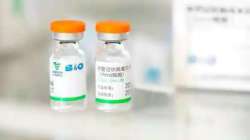WHO China chief says approval for 1st Chinese vaccine a 'milestone achievement'
In a big relief for China, the WHO on Friday finally granted the conditional approval to its Sinopharm COVID-19 vaccine for emergency use making it the first vaccine from a non-western country to get the recognition.

The WHO''s China chief has termed the conditional approval granted by the global health body to China’s first COVID-19 vaccine Sinopharm as a “milestone achievement” which will create an opening to significantly increase the global supply of vaccines.
“The decision announced on Friday by the World Health Organisation in Geneva to grant Emergency Use Listing (EUL) to a COVID-19 vaccine manufactured in China represents a milestone achievement," Dr Gauden Galea, WHO Representative to China, said in a statement here on Saturday.
He said the approval of Sinopharm vaccine may spur similar recognition by the WHO to 15 other coronavirus vaccines being developed by China.
“One vaccine has received EUL, but we know that there are over fifteen additional COVID-19 vaccines in advanced development in China. Today’s milestone achievement should spur other manufacturers to pursue this route and add to the global vaccine arsenal," he said.
“It should also encourage an even greater contribution from China to global supply and vaccine equity," he said. In addition to Sinopharm, WHO is expected to grant approval to another Chinese vaccine, Sinovac, in the coming days.
In a big relief for China, the WHO on Friday finally granted the conditional approval to its Sinopharm COVID-19 vaccine for emergency use making it the first vaccine from a non-western country to get the recognition.
The WHO listing is expected to help China step up its vaccine diplomacy amid the surge in coronavirus vaccines in several countries.
China is also expected to ramp up its vaccine supplies especially in South Asia as the supplies from India faced difficulties in view of the COVID-19 surge in the country.
China has approved about five of its vaccines for emergency use and especially using Sinopharm and Sinovac vaccines for both at home and abroad.
While WHO has listed the Pfizer/BioNTech, Astrazeneca-SK Bio, Serum Institute of India, Moderna and Janssen vaccines for emergency use, the Chinese vaccine got delayed recognition due to data related issues.
Commenting on Sinopharm’s WHO approval, Yang Xiaoming, chairman of Sinopharm China National Biotec Group (CNBG), which rolled out the vaccine, said until now his firm has produced 200 million doses mostly to be sent to foreign countries.
"The vaccines have been approved for registration, marketing and emergency use in more than 60 countries and regions, and have helped 80 countries. More than 100 countries plan to use it," he told state-run CGTN-TV.
Though China has been supplying vaccines to various countries, especially in Asia and Africa, many countries hesitated using the vaccine as it has not secured recognition from the WHO.
China was eagerly awaiting the global health body''s nod for it to aggressively push the vaccine among different countries.
China has joined the COVAX global vaccine distribution campaign backed by GAVI and WHO and committed to provide 10 million vaccines. The WHO approval to Sinpharm is expected to speed up China’s supplies to COVAX.
COVAX aims to send vaccines for free to 92 lower-income countries and to help another 99 countries and territories procure them.
The two jab Sinopharm vaccine is an inactivated vaccine called SARS-CoV-2 Vaccine (Vero Cell). Its easy storage requirements make it highly suitable for low-resource settings, the WHO press release said.
Its efficacy which stated to be 79 per cent is, however, below the efficacy rates of other WHO vaccines which are in the range of 90 per cent.
WHO has okayed Sinopharm usage from 18 years and above, clarifying lingering doubts about its usage for people above 59 years.
"WHO is not recommending an upper age limit for the vaccine because preliminary data and supportive immunogenicity data suggest the vaccine is likely to have a protective effect in older persons," the WHO said.